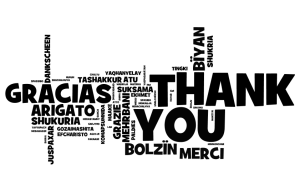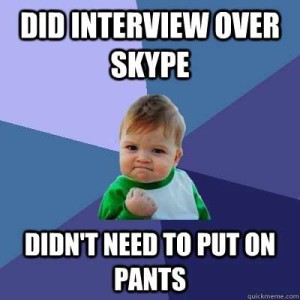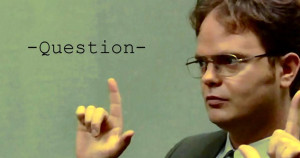 There are a lot of resources on the web about why interviews go bad. Here are a few things to keep in mind before, during and after the interview.
There are a lot of resources on the web about why interviews go bad. Here are a few things to keep in mind before, during and after the interview.
Before the interview: A lot of people fail before the interview ever starts.
Follow instructions: If they tell you to bring 3 copies of your resume, bring three. If they tell you to dress professionally, do it. I have some friends that were Army Rangers. When you are sent to Ranger school they tell you EXACTLY what to and what NOT to bring. Guess what? If you bring Gortex socks.. you’re out! No really, they send you packing.
Plan who, what, when, where: Who are you meeting with? Look them up on LinkedIn. What do you need to bring and wear? Don’t wait till the day of or before you print off your resume, shine your shoes (yes, it does matter), press your clothes, etc… When do you need to be there? Reconfirm the date and time with the company. If it is a phone interview watch out for time zones. Where are you going? Plan for traffic, parking, and other issues. Remember your P’s: prior planning prevents poor performance.
Research: We already mentioned researching the people. It is VERY impressive if you introduce yourself before they do. How can you do that? Look them up on LinkedIn, most people have a head shot. Also research the industry, competitors, company, and position. Glassdoor is a great resource for this. I have said this a lot but it continues to be true, just ready a company’s website seems to be rare these days.
Write down your questions: It does not matter whether you write them in your phone, tablet or put pen to paper but write down your questions and bring them with you. That way you don’t have to worry about remembering them. It also gives you the ability to take some notes.
During the interview: The interview starts the moment you walk out your door.
Driving: Take your time since you left early. Don’t get stressed out and be gracious to other drivers. That person you just told were number one? That might be the hiring manager. It has happened! I usually arrive 20 – 30 minutes early and scout out the place. Then wait somewhere close by and come back 15 minutes before your interview time. No rush.
Arriving: Assume that someone (everyone) is watching you as you get out of your car. The visitor spots are often times in top-management’s view. Get your smile on. Remember, we usually ask everyone what they thought about you, including the receptionist.
Body language: This is sometimes a cultural issue but you want to make good eye contact but don’t stare. Have a good firm but not painful handshake. Sit on not in the chair and lean forward a little. Don’t cross your arms or play with your hair. Watch out for nervous habits that can be distracting. Good posture.
Dress for Success: This use to always mean wearing a suit but these days it can have different meanings. The basics are to be sure your clothes are clean and fit well. You do not want to be uncomfortable in the interview. You want to match the culture of the company and dress just a little better than the management.
Q & A: There are too many issues and options to discuss here. I will blog about interview questions soon.
Questions to ask: Here is a blog post I did on questions to ask in an interview. They are very important for you and the company.
After the interview: Do your best to get everyone’s contact information during the interview.
Thank you: Be sure to write each person a thank you email. Thank them for their time, tell them again why you want the position, why you are a good match for them, and you look forward to the next step in the process. You did ask that, right?
Follow up: If you have not heard from them in the time frame they gave you I would follow up. When you have not heard from them always assume the best. Maybe their email went in your spam filter. Maybe your roommate forgot to give you the message. Maybe they dialed the wrong number.
Aside from being a bad match for the position or the position a bad match for you most people mess up in the one of the areas above. Remember, just because you did not get a job it does not mean that “messed” up. Sometimes there was a better match in the process or maybe they saw something that leads them to believe you would not be happy or successful in the position.
 I listened to another great Freakanomics podcast this morning. It was The Maddest Men of All. In this podcast Michael Housman, chief analytics officer for Cornerstone OnDemand, talks about employment testing. It seems that about 2/3rds of employers use some type of assessment in the hiring process.
I listened to another great Freakanomics podcast this morning. It was The Maddest Men of All. In this podcast Michael Housman, chief analytics officer for Cornerstone OnDemand, talks about employment testing. It seems that about 2/3rds of employers use some type of assessment in the hiring process.







